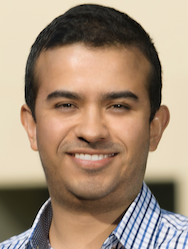Spring ’18 Joint CSC@USC/CommNetS-MHI Seminar Series
 |
Jorge Poveda,
University of California, Santa Barbara
|
Abstract
The deployment of advanced real-time control and optimization strategies in socially-integrated engineering systems could significantly improve our quality of life while creating jobs and economic opportunity. However, in cyber-physical systems such as smart grids, transportation networks, healthcare, and robotic systems, there still exist several challenges that prevent the implementation of intelligent control strategies. These challenges include the existence of limited communication networks, dynamic environments, multiple decision makers interacting with the system, and complex hybrid dynamics emerging from the feedback interconnection of physical processes and computational devices. In this talk, I will present a set of tools for the analysis and design of model-free feedback mechanisms that can cope with these challenges, and that are suitable for the real-time control and optimization of cyber-physical societal systems. The first part of the talk will focus on the problem of designing a class of robust model-free adaptive pricing mechanisms for systems such as the smart grids, transportation networks, and the Internet, where users behave in a selfish way, and where the objective of the social planner is to maximize the total welfare of the system. Next, I will show that this problem belongs to a broader family of model-free extremization problems, and I will present a general framework for the design of a family of algorithms that can successfully optimize the performance of cyber-physical systems having unknown mathematical models. Finally, I will illustrate how these results can be extended to achieve distributed control of large-scale autonomous systems by implementing novel robust coordination and synchronization feedback mechanisms. The talk will finish by discussing some future directions and preliminary results in the areas of data-driven hybrid control and security in stochastic learning dynamics.
Biosketch
Jorge I. Poveda is a PhD Candidate at the Center for Control, Dynamical Systems, and Computation (CCDC) at the University of California, Santa Barbara. He received the BS degrees in Electronics Engineering and Mechanical Engineering in 2012, and the MS degree (Magna Cum Laude) in Electrical Engineering in 2013, all from University of Los Andes, Bogota, Colombia, and the MS degree in Electrical and Computer Engineering from the University of California, Santa Barbara, in 2015. He was a Research Intern with the Mitsubishi Electric Research Laboratories in Cambridge, MA, during the summers of 2016 and 2017. He received the 2013 CCDC Outstanding Scholar Fellowship at UCSB, and was a finalist for the Best Student Paper Award at the 56th IEEE Conference on Decision and Control in 2017. His main research interests lie at the intersection of robust feedback control theory, adaptive control, online optimization, and game theory, with applications to cyber-physical and societal systems.
